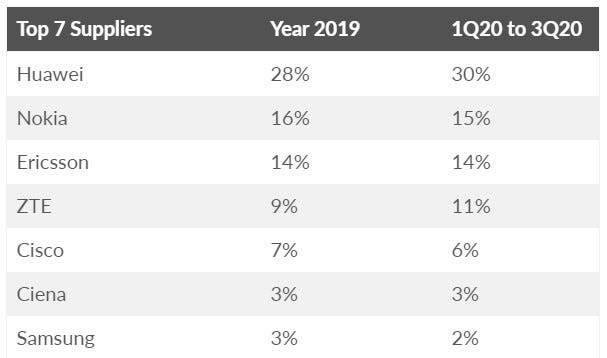You might think, with all the drama surrounding Huawei this year, that it would have lot market share. But, according to market tracker Dell’Oro, the opposite is true.
December 3, 2020

You might think, with all the drama surrounding Huawei this year, that it would have lot market share. But, according to market tracker Dell’Oro, the opposite is true.
As you can see from the table below, Huawei and ZTE are both on course to gain two percentage points of market share each this year, at the expense of Nokia, Cisco and Samsung. With investments in China outpacing the overall market, we estimate Huawei and ZTE collectively gained about 3 percentage points of revenue share,” wrote Dell’Oro Analyst Stefan Pongratz in his blog on the matter, implying they actually grabbed around 1.5 percentage points each.

Pongratz also noted that telecoms continues to out-pace the broader economy. “The overall telecom equipment market continued to appear disconnected from the underlying economy,” he wrote. “While the on-going transition from 4G to 5G is helping to offset reduced capex in slower-to-adopt mobile broadband markets, we also attribute the disconnect to the growing importance of connectivity and the nature of this recession being different than in other downturns improving the visibility for the operators.”
All this serves as a reminder of the sheer size and importance of the Chinese telecoms market. Judging from a report by China Daily, there’s little sign of that changing next year. It spoke to Wu Hequan, an academician at the Chinese Academy of Engineering, who reckons China will build over a million 5G base stations next year, taking the grand total to 1.7 million by the end of the year.
“As the construction of 5G networks accelerates, the cost of building each 5G base station will go down,” said Wu. “Even if Chinese telecom carriers earmark the same amount of 5G investments in 2022 as they have done this year, they can build far more 5G base stations next year than this year. I believe Chinese telecom carriers will build more than one million 5G base stations next year, though the specific construction targets will have to wait for the telecom carriers’ official announcements.”
Even allowing for the fact that Wu and China Daily both know better than to deviate from the approved CCP narrative, this seems like a plausible projection. If anything, the aggro with the US will have made the Chinese state all the more determined to ensure its domestic telecoms industry goes from strength to strength and we wouldn’t be surprised to be writing a similar report in a year’s time.
About the Author(s)
You May Also Like








.png?width=300&auto=webp&quality=80&disable=upscale)


_1.jpg?width=300&auto=webp&quality=80&disable=upscale)


.png?width=800&auto=webp&quality=80&disable=upscale)